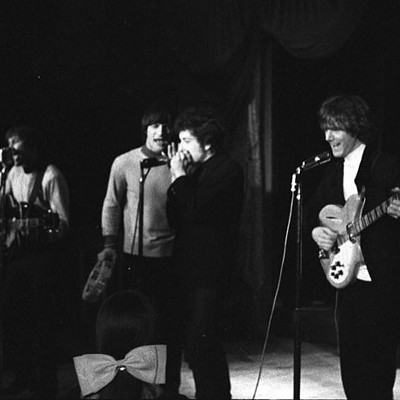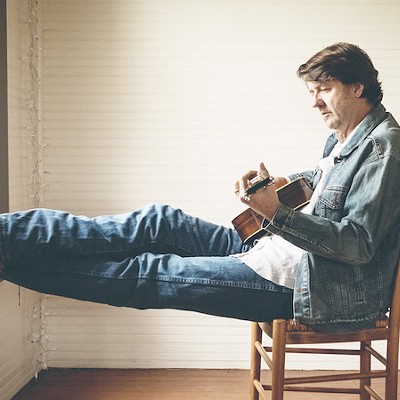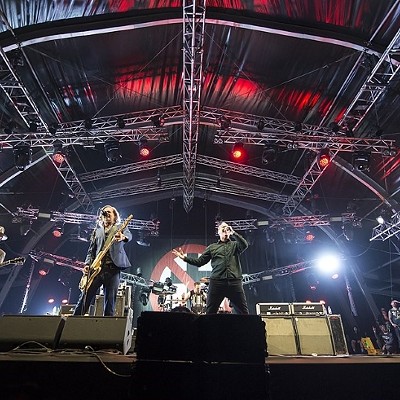"Alpine Valley, in the middle of the night," begins Jimmie Vaughan's "Six Strings Down," his account of the time heaven called another blues singer back home - namely, his brother Stevie Ray Vaughan. Shortly after he finished an all-star blues jam with his brother, Eric Clapton, Buddy Guy and Robert Cray at the Alpine Valley Amphitheater in East Troy, Wisc., Vaughan's Chicago-bound helicopter crashed shortly after takeoff in the early-morning hours of August 27, 1990 - 20 years ago today.
As you can see from the above mural at Houston guitar shop Rockin' Robin, Vaughan is as popular now as when he was alive. Rocks Off thought a good person to talk some SRV with would be Houston's own The Mighty Orq, who thanked "all the people who yell 'Play some Stevie!'" in the liner notes of his 2008 album, To the Bone. We emailed him some questions about Vaughan earlier today, and Orq got back to us shortly after arriving in the Ozarks, where he and his two bandmates are playing Deb's Blues Farm in Davenport, Mo. Saturday night.
They'll be back in time for their regular gig at The Big Easy Monday night.
Rocks Off: What was your first experience with SRV's music?
The Mighty Orq: My first experience of Stevie's music was when I purchased Couldn't Stand The Weather when I was 14. It pretty much blew my mind.
RO: Did you ever see him play live?
TMO: I didn't ever see him play live, and wasn't even really aware of his music until after he died.
RO: How much has he influenced your own guitar playing?
TMO: As a teenager, he was definitely a big, if not the biggest, influence on my playing. From his phrasing and technique, to the sort of intensity that he brought to a performance.
RO: Is there any particular way he has influenced your guitar playing?
TMO: As far as particulars go, I would say that these days my note choice and phrasing have changed a significant amount, but I still like to think the underlying emphasis on passion and energy that I picked up as a youngster are still there.
RO: What were you doing when you found out he had died?
TMO: When he died I remember hearing about it on the news. I was only 11 and didn't know about his music so it didn't have a huge emotional impact on me until later when I became a fan.
RO: Why do you think he's still such an icon, especially in Texas?
TMO: He may still be such an icon because he made blues music acceptable and accessible to an audience that hadn't been familiar with it before. In Texas, at the time he gained fame, Cosmic Cowboy or Outlaw Country was all the rage so blues was certainly something outside of the norm.
RO: When people say you play like he does, do you find that flattering or annoying?
TMO: I think most of the time it's definitely meant as a compliment. Stevie's music and style are still so popular, though, that I think a lot of guitarists want to distance themselves from that label. Most artists don't want to be thought of as a clone of another artist.
RO: How important do you think SRV is to the blues?
TMO: I think Stevie is still important to blues not only as an immensely talented and iffluential musician in his own right, but also as perhaps a jumping-off point for newcomers to the genre. In his music you hear so many of the greats - Albert, Freddie & B.B. King, Lightnin' Hopkins, Hubert Sumlin, Otis Rush, etc. And he credits all of them, so you can go back to the source.
RO: If you were making an SRV mixtape, what song would you start with, and what song would you end with? Why?
TMO: I would start a Stevie mixtape with "Scuttle Buttin'" because it showcases his immense guitar prowess. As a matter of fact, I'd just make a copy of the whole Couldn't Stand The Weather album and then Live at The El Mocambo album, and leave the order intact. Those two albums are my absolute favorite of his.
The studio album is completely varied stylistically. From rock to blues to the Grant Green-style jazz track at the end, it's a seriously monstrous album. Live at The El Mocambo showcases his live capabilities the highlights of which are, to me, his incredible signature tone as well as some super-fast runs, but simultaneously a subtlety with his touch that is truly beautiful.






